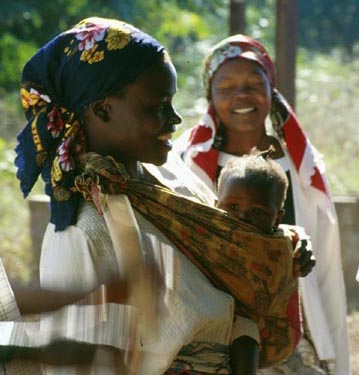
Here, we have a variety: Curandeiros are the traditional healers, while feticeiros are more of the “witch doctor” types. In addition to that, there are also a number of people in the market who sell roots, herbs, and random objects used to bring luck, get rid of headaches or illnesses, etc. Curandeiros are known to the village, and many people consult them on important matters, in addition to medical ones. When Lindsay’s phone was stolen while we were walking down the street, students urged her to go see a curandeiro. Many children have necklaces or waist beads given to them by the curandeiro- probably for good growth and safety. One of our neighbors is a curandeiro, and his children, the goat-herding boys, are some of our best friends here. None of them has been to a doctor. When they get sick, their father will perform a ceremony and perhaps give them something natural to help cure them.
Peace Corps Volunteer "I like to spend some time in Mozambique" writes: In African culture, many people rely on traditional healers in lieu of or in addition to doctors, nurses, and other healthcare-givers. It is no exception in Catandica
Friday, March 6, 2009
February and early March
Alfredo and the Feticeiro:
In African culture, many people rely on traditional healers in lieu of or in addition to doctors, nurses, and other healthcare-givers. It is no exception in Catandica. Here, we have a variety: Curandeiros are the traditional healers, while feticeiros are more of the “witch doctor” types. In addition to that, there are also a number of people in the market who sell roots, herbs, and random objects used to bring luck, get rid of headaches or illnesses, etc.
Curandeiros are known to the village, and many people consult them on important matters, in addition to medical ones. When Lindsay’s phone was stolen while we were walking down the street, students urged her to go see a curandeiro. Many children have necklaces or waist beads given to them by the curandeiro- probably for good growth and safety. One of our neighbors is a curandeiro, and his children, the goat-herding boys, are some of our best friends here. None of them has been to a doctor. When they get sick, their father will perform a ceremony and perhaps give them something natural to help cure them.
On the other hand, feticeiros are much more mysterious and eerie. Feticeiros are not known to people while they are alive. It is only when they die that their identity may be revealed, though I’m not sure how that works. In order to be a feticeiro, someone else in your family must have been a feticeiro. Feticeiros may “curse” people and cause them pain and problems.
There is a 10th grade student named Alfredo that visits us quite frequently. He watched our house while we were away for our December holidays. Alfredo is very bright, industrious, and ambitious. His family, however, does not support his studies. They are all farmers, many of whom are alcoholics, according to Alfredo. Noone has studied past the 7th class, and he has been pressured to leave his studies to work in the fields with the rest of his family.
One day, Alfredo came to our house and was upset. He said that he had been “feticizado,” which means cursed by the feticeiro, and that someone in his family had done it. He was suffering from body aches and generally wasn’t feeling well. Somebody said to him: “Eu quero ti ver bem o proximo ano” (“I want to see you well next year,”) which is a sign that you have been feticizado. He went to the curandeiro, who apparently cured him, but he was still nervous about his family’s actions towards him as a result of his studies.
It seems amazing to me that he believes so strongly in the curandeiro and feticeiro, since he is intelligent and being educated. He was aware that we have no curandeiros/ feticeiros in the States yet insisted that the powers of the curandeiro and feticeiro are real here.
Alfredo is still studying this year and has hopes not only of being the first person in his family to finish secondary school but also to study in university. I hope he is able to follow through with that and to help overcome the conflict many Mozambicans have between modernization and tradition.












